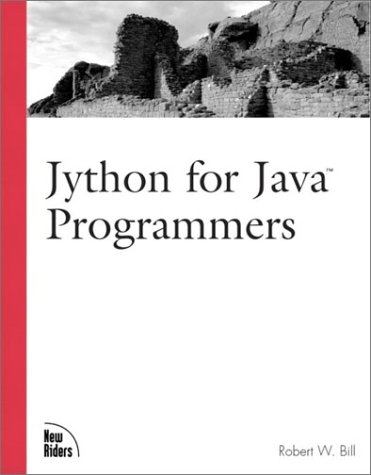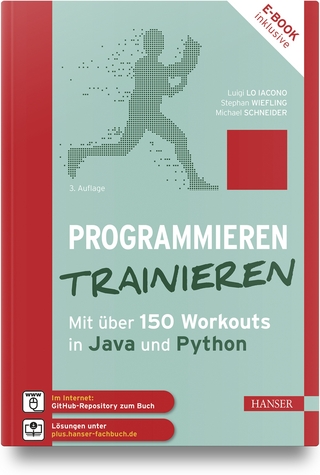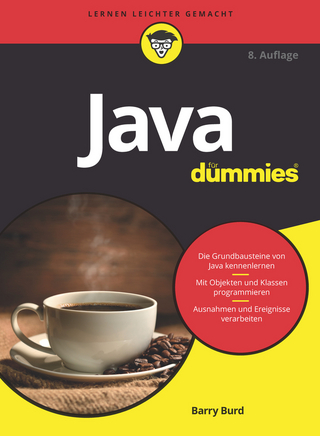
Jython for Java Programmers
New Riders Publishing (Verlag)
978-0-7357-1111-2 (ISBN)
- Titel ist leider vergriffen;
keine Neuauflage - Artikel merken
This book will help Java developers to increase application development and deployment, thus optimizing their overall efficiency.
A brief introduction is provided that shows the differences between Java and Jython, important to include so that the reader will have a better understanding of why their union is beneficial.
The remainder of the book teaches, through examples, how to use Jython. Intended for an experienced Java developer, this book assumes you understand the fundamentals to programming (i.e. loop statements, if.then, etc.). So, page space is focused on utilizing Jython with Java by covering the following: extending Python with java classes, modules, compiling, interpreters, design integration, etc.
www.newriders.com contains all code and applications developed in the book.
Robert W. Bill currently dedicates his time to software design and development in Python, Jython, and Java as an independent contractor. His experiences include a four-year tenure with the Minnesota Educational Computing Consortium, The Learning Company, and Mattel. Robert has studied at Baylor University, followed by various courses in music and sciences at the Eastman School of Music and the University of Wisconsin-Madison. These reviewers contributed their considerable hands-on expertise to the entire development process for Jython for Java Programmers. As the book was being written, these dedicated professionals reviewed all the material for technical content, organization, and flow. Their feedback was critical to ensuring that Jython for Java Programmers fits our reader's need for the highest quality technical information. As member of the research staff at the California Institute of Technology, Dr. Robert Brunner focuses on Knowledge Discovery and Data-Mining in very large, heavily distributed databases. He also has been a Java and XML instructor at the Center for Advanced Computing Technology operated by the California State Polytechnic University at Pomona for the last two years. Recently, he has written a series for Java Developers Journal, reviewed numerous proposals for a variety of publishing houses, and has edited texts covering Linux, C++, Java, and XML. He is currently completing Enterprise Java Database Programming to be published by Addison Wesley, Inc. John Ha is a support engineer and technical writer at NeTraverse, a software development firm in Morrisville, North Carolina. John is responsible for printed and online documentation for the firm's flagship product, Win4Lin. Win4Lin allows Microsoft Windows to be installed on a host Linux system. John also investigates distributed filesystem and remote display technologies for NeTraverse's server product currently under development. John earned his Bachelor of Arts degree in English Literature from the University of Connecticut in Storrs, Connecticut.
I. JYTHON.
1. Jython Syntax, Statements, and Comments.
The Interactive Console. Line Separators and Block Indentation Syntax. Comments. Documentation Strings. Statements. Comparing Jython and Java.
2. Operators, Types, and Built-In Functions.
Identifiers. Jython Data Objects. Operators. Built-Ins. Comparison of Jython Data Types and Java Data Types. Java Types.
3. Errors and Exceptions.
Jython Exceptions. Exception Handling. The raise Statement. Tracebacks. The assert Statement and the __debug__ Variable. The Warnings Framework. Comparing Jython and Java.
4. User-Defined Functions and Variable Scoping.
Defining Functions. Namespaces. Recursion. Built-In Functional Programming Tools. Synchronization.
5. Modules and Packages.
The import Statement. A Comparison of Jython and Java. Python's package.module Hierarchy. Java's package.class Hierarchy. Reloading.
6. Classes, Instances, and Inheritance.
Encapsulation, Abstraction, and Information Hiding. Defining Jython Classes. Jython Class and Instance Attributes. Constructors. Finalizer or Destructor. Inheritance. Method Overloading. Sample Classes.
7. Advanced Classes.
Pre-Existing Class Attributes. Pre-Existing Instance Attributes. Special Methods for General Customization. Dynamic Attribute Access. The Callable Hook-__call__. Special Comparison Methods. Object “Truth”. Emulating Built-In Data Objects.
II. JYTHON INTERNALS AND INTEGRATING JYTHON WITH JAVA.
8. Compiling Jython with jythonc.
What Is jythonc? Compiling a Module with jythonc. Paths and Compiled Jython. jythonc Options. Java-Compatible Classes.
9. Embedding and Extending Jython in Java.
Embedding Jython. Embedding the InteractiveInterpreter. Embedding an InteractiveConsole. Extending Jython.
III. APPLICATIONS WITH JYTHON.
10. GUI Development.
Comparing a Java and Jython GUI. Bean Properties and Events. The pawt Package. Examples.
11. Database Programming.
DBM Files. Serialization. Database Management Systems. JDBC. zxJDBC.
12. Server-Side Web Programming.
Jython Servlet Containers. Defining Simple Servlet Classes. More About GenericServlet. HttpServlet. PyServlet. Cookies. Sessions. Databases and Servlets. JSP.
IV. APPENDIX.
Appendix A. Jython Statements and Built-In Functions Quick Reference.
Index.
| Erscheint lt. Verlag | 3.1.2002 |
|---|---|
| Sprache | englisch |
| Maße | 227 x 178 mm |
| Gewicht | 710 g |
| Themenwelt | Mathematik / Informatik ► Informatik ► Netzwerke |
| Informatik ► Programmiersprachen / -werkzeuge ► Java | |
| Mathematik / Informatik ► Informatik ► Web / Internet | |
| ISBN-10 | 0-7357-1111-9 / 0735711119 |
| ISBN-13 | 978-0-7357-1111-2 / 9780735711112 |
| Zustand | Neuware |
| Haben Sie eine Frage zum Produkt? |
aus dem Bereich


